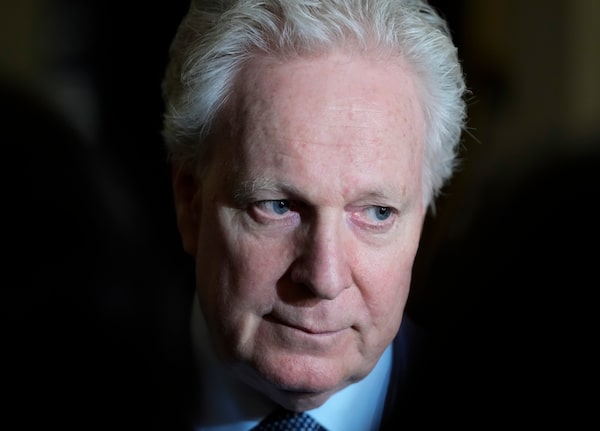A protester dances on a concrete jersey barrier in front of vehicles and placards on Rideau Street, during a protest against COVID-19 measures on Feb. 16.Justin Tang/The Canadian Press
The truckers’ convoys that blocked Ottawa streets and border crossings won applause from some Conservatives, but not Jean Charest.
The former Quebec premier, launching his bid for the Conservative Party leadership, argued that anyone who wants to be prime minister must stand up for law and order.
“If you want to be the chief legislator of Canada, you have a responsibility – and that responsibility is not optional – to respect the rule of law,” he said in an interview in Montreal. “I believe in the rule of law. And that’s a Conservative value.”
It is true that the Conservative Party has considered itself the party of law and order. Yet you have to wonder if Mr. Charest’s stand on the convoys – or Mr. Charest himself – will fit with the mood of the current Conservative Party.
Jean Charest says he’s opposed to Bill 21 and favours more oil and gas production
The putative front-runner in the leadership race, Ottawa MP Pierre Poilievre, cheered for the convoys, posted a picture of himself delivering doughnuts to a trucker and, as convoy blockades developed, Mr. Poilievre said he was proud of the truckers.
So when Mr. Charest says that anyone who wants to be prime minister has to stand up for the rule of law, he’s talking about Mr. Poilievre – even if he’s not mentioning any names.
Mr. Charest said that the convoys expressed the frustration “and in some cases anger” that politicians must acknowledge. He said governments should give people “forward guidance” to reassure them that pandemic measures won’t last forever. And he noted that he wasn’t criticizing every Tory MP who met with a protester.
“You know, some people went out to say hello to constituents. I don’t have a problem with that,” he said. “But at the end of the day, if you are going to be prime minister of Canada, respecting the rule of law is part of the job.”

Former Quebec premier Jean Charest speaks with reporters as he arrives for an event with potential Conservative caucus supporters in Ottawa on March 2.Justin Tang/The Canadian Press
There were Conservative MPs – and Ontario’s Tory Premier, Doug Ford – who criticized the trucker convoys for breaking the law. But it’s not something elected Conservatives have been keen to debate. A large number of rank-and-file Conservatives vehemently back the convoys. And Mr. Poilievre rode the convoy protest sentiment into the leadership race.
But Mr. Charest isn’t channeling the kind of anger expressed in the Twitterverse or in four-letter-word slogans about Justin Trudeau. He can campaign: The wily veteran politician comes with a ton of political baggage, including ethical allegations that surrounded the Quebec government he led, but no one can doubt his political skills. But he isn’t doing it with that populist edge.
His main pitch is that he would expand the Conservative reach to all parts of the country. On many issues, he picks a careful path. Is he ready for the rough contrasts of a meme campaign?
Erin O’Toole won the past leadership race with that kind of campaign. Mr. Poilievre didn’t launch his bid with interviews the way Mr. Charest did, presumably because many of Mr. Poilievre’s supporters abhor the news media. He announced his bid in a tweet, and his first big public outing in Regina framed a promise to kill carbon levies – followed by internet memes.
In the interview, Mr. Charest said he is in favour of increasing oil and gas production and that Russia’s invasion of Ukraine is an opportunity to rethink energy security. There will be Alberta Conservatives who appreciate that a Quebec candidate is talking up oil and gas and launching his campaign in Calgary.
But Mr. Charest, who as Quebec premier brought in a cap-and-trade regime, won’t say if he would keep the carbon levies brought in by Mr. Trudeau’s Liberals which are slated to rise from $40 per tonne to $170 by 2030. He said he would talk about that later in the campaign.
Okay. It’s Day 1. Mr. Charest did say he believes Canada can expand oil and gas and also transition to net zero, and that will include some form of carbon pricing. The details would be interesting – but it isn’t the pithy kill-the-carbon-tax plank that has been a must-have for Conservative leadership contenders. Mr. Poilievre can express his policy in only four words: scrap the carbon tax.
The newer type of meme-driven social-media campaigns will be one challenge for Mr. Charest. But not only that. Mr. Charest’s assertion about the truckers’ convoys and the rule of law does fit with traditional Conservative values.
But it is not clear that it fits the party’s mood – or if Mr. Charest can fit in with it, either.
For subscribers: Get exclusive political news and analysis by signing up for the Politics Briefing.
 Campbell Clark
Campbell Clark